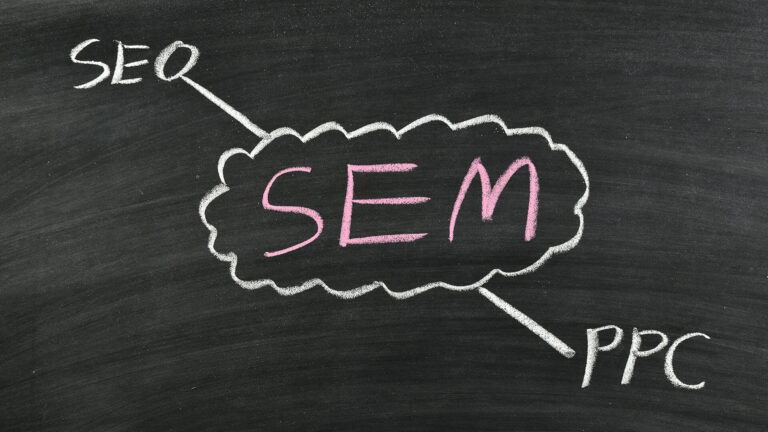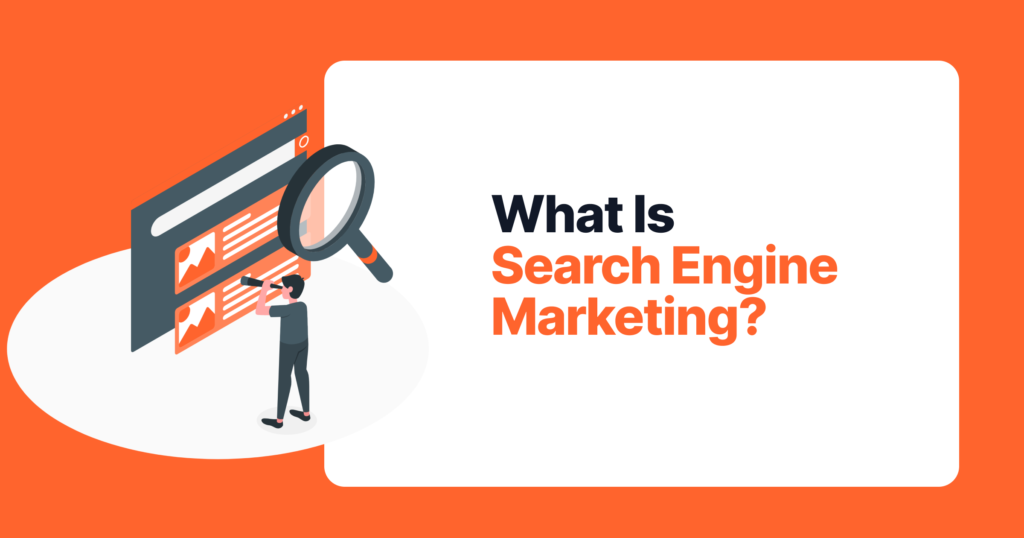What Is Search Engine Marketing? A Comprehensive Guide.

Unlock the Power of Search Engine Marketing.
Search Engine Marketing (SEM) is a powerful and effective digital marketing tool used to take businesses to the next level. It is a type of online advertising used to increase visibility and improve website traffic. It involves the use of search engine optimization (SEO) techniques and paid search advertising to help businesses achieve higher rankings in search engine results pages (SERPs). SEM can be used to target specific audiences and can provide immediate results. It is an important part of any comprehensive digital marketing strategy as it can help businesses gain brand awareness, drive traffic to their website, and ultimately increase sales. Businesses of all sizes can benefit from SEM as it is cost-effective, easy to track, and provides measurable results.
In this comprehensive guide:
- we will discuss what search engine marketing is & the benefits of using it.
- The components of SEM.
- How to implement an effective SEM campaign.
- The role of keywords in SEM.
- Paid search advertising.
- SEO best practices, and finally.
- Measuring and optimizing your SEM results.
1. What is Search Engine Marketing?
Search Engine Marketing is the process of gaining visibility and website traffic by optimizing your website for search engine algorithms and using paid search advertising. It involves a combination of SEO and paid search tactics to increase your rankings and visibility in the SERPs. The goal of SEM is to drive more traffic to your website, increase brand awareness, and ultimately increase sales. SEM is a type of digital marketing that involves creating and optimizing content to appear on search engine results pages (SERPs). It can also include creating paid campaigns to target potential customers. SEM is different from SEO (search engine optimization), which focuses on organic traffic and unpaid promotions to increase visibility.
2. Benefits of Search Engine Marketing.
The main benefit of Search Engine Marketing is that it can help you reach a wider audience and drive more traffic to your website. It can also be used to target specific audiences and can provide immediate results. SEM is also cost-effective, easy to track, and can provide measurable results. Additionally, it can help you build brand awareness, increase your visibility in the SERPs, and ultimately increase sales. Search engine marketing helps you in ranking.

Search engine marketing is also highly targeted and can help you reach the right people. You can target specific audiences based on their interests, geographic location, and other demographic information. This can help you refine your targeting and increase conversions.
3. SEO vs. SEM
SEO and SEM are two distinct digital marketing methods/tools, but they are often used together for maximum effectiveness. SEO focuses on optimizing your website for search engine algorithms, while SEM focuses on paid search advertising. Both are used to increase visibility and website traffic, but SEO is more focused on organic traffic and unpaid promotions, while SEM involves paid campaigns.
SEO focuses on optimizing your website for search engine algorithms. This includes creating content that is relevant to your target audience, optimizing page titles and URLs, and making sure your website is easy to navigate. SEO also involves building backlinks, optimizing site speed, and making sure your website is accessible to search engine crawlers. SEM focuses on paid search advertising. This includes creating ads that are relevant to your target audience, setting up a budget for your campaigns, and monitoring your campaigns for results. SEM is a more targeted type of marketing, as you can target specific audiences based on their interests and other demographic information.
4. The Components of SEM
The components of SEM include keyword research, content creation, link building, and paid search advertising. Keyword research is the process of determining what keywords are most relevant to your target audience and creating content around those keywords. Content creation involves creating content that is engaging, relevant, and optimized for search engines. Link building involves creating backlinks to your website, which helps to increase your rankings in the SERPs. Paid search advertising involves setting up campaigns on search engines such as Google and Bing, which can help to drive more traffic to your website.
5. How to Implement an Effective SEM Campaign
Implementing an effective SEM campaign involves devising a strategy, researching keywords, creating content, setting up a budget, and tracking your results.
The first step is to devise a strategy for your SEM campaign. This involves setting objectives and goals for your campaign, as well as determining which keywords you want to target. Once you have a strategy in place, you can begin researching keywords. This involves using tools such as Google Adwords and Moz to determine which keywords are most relevant to your target audience. Once you have identified the keywords you want to target, you can begin creating content around those keywords. This involves creating content that is engaging, relevant, and optimized for search engines. You can also use keyword-rich titles and meta descriptions to help your content appear in the SERPs.
Once your content is created, you can set up a budget for your campaigns. This involves determining how much you are willing to spend on each campaign and setting a budget accordingly. You can also set daily or monthly budgets to ensure you don’t overspend. Once your campaigns are set up, you can begin tracking your results. This involves monitoring your campaigns to see which ones are performing well and which ones need to be optimized. You can also use tools such as Google Analytics to track the performance of your campaigns and make adjustments accordingly.
6. The Role of Keywords in SEM
Keywords are an important part of any Search Engine Marketing campaign. They are used to determine which search queries your website should appear for and how your content should be optimized. Keywords can also be used to target specific audiences and can help you reach the right people. When it comes to keyword research, it is important to identify the keywords that are most relevant to your target audience. You can use tools such as Google Adwords and Moz to research the keywords that are most popular with your target audience. You can also use long-tail keywords to target more specific audiences and to help your content appear in the SERPs.
Once you have identified the keywords you want to target, you can begin optimizing your content for those keywords. This involves using the keywords in your titles, meta descriptions, and content. It is also important to use the keywords in a natural way and to avoid keyword stuffing, as this can negatively impact your rankings. When it comes to keyword research, it is important to identify the keywords that are most relevant to your target audience. You can use tools such as Google Adwords and Moz to research the keywords that are most popular with your target audience. You can also use long-tail keywords to target more specific audiences and to help your content appear in the SERPs. Once you have identified the keywords you want to target, you can begin optimizing your content for those keywords. This involves using the keywords in your titles, meta descriptions, and content. It is also important to use the keywords in a natural way and to avoid keyword stuffing, as this can negatively impact your rankings.
7. Paid Search Advertising
Paid search advertising is an effective way to drive more traffic to your website. It involves setting up campaigns on search engines such as Google and Bing. This type of advertising allows you to target specific audiences based on their interests, geographic location, and other demographic information. When it comes to paid search advertising, it is important to create ads that are relevant to your target audience. You should also ensure that your ads are optimized for the keywords you are targeting. Additionally, you should set up a budget for your campaigns and monitor your results to ensure that your ads are performing well.
8. SEO Best Practices for SEM
There are a few SEO best practices that you should keep in mind when creating an SEM campaign. These include optimizing your website for search engine algorithms, creating content that is relevant to your target audience, building backlinks, optimizing site speed, and making sure your website is accessible to search engine crawlers. When it comes to optimizing your website for search engine algorithms, it is important to create content that is relevant to your target audience. You should also use keywords in your titles and meta descriptions to help your content appear in the SERPs. Additionally, you should optimize your page titles and URLs to make sure that they are easy to understand.
Link building is another important SEO best practice. This involves creating backlinks to your website from other websites. This helps to increase your rankings in the SERPs and can also help to drive more traffic to your website. Finally, it is important to optimize your website speed. This involves making sure your website loads quickly and that your pages are optimized for mobile devices. Additionally, it is important to make sure your website is accessible to search engine crawlers. This can help to ensure that your content is indexed properly and that it appears in the SERPs.
9. Measuring and Optimizing Your SEM Results
Once you have implemented your SEM campaign, it is important to track and measure your results. This involves monitoring your campaigns to determine which ones are performing well and which ones need to be optimized. You can use tools such as Google Analytics to track the performance of your campaigns and make adjustments accordingly.
You should also track your conversions to determine which keywords and campaigns are driving the most sales. This can help you refine your targeting and optimize your campaigns for better results. Additionally, you can track your ROI to determine whether or not your campaigns are generating a positive return on investment.
Also follow me on Instagram

